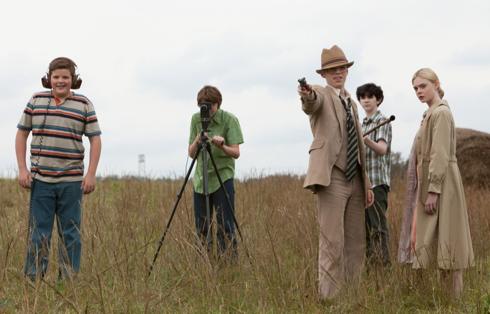Oh, where to begin with Super 8? It’s just lovely. I almost feel like poking holes in it would be like telling kids there’s no Santa Claus, which is convenient because there’s literally only one thing wrong with this movie, and it’s tiny: writer-director J.J. Abrams is a little too in love with lens flare. See what I mean? Even mentioning it is like, “so what?” Still, I figure getting rid of the negativity early so I can rant about how enchantingly fantastic this movie is is the way to go, so without further ado, let us geek out.
There’s only so much of the plot one can recount without spoilers, and part of what makes Super 8 so great is the deliberate pace with which it reveals what’s really going on. It’s the story of a group of kids—whose relationships are fully, completely established perfectly in about two minutes—who make movies together in their small Ohio town. One night, when shooting a scene from their (truly hilarious and deeply cute, and that last is not in any way a mark of condescension) zombie movie, a train goes by. They keep shooting (for “production values!” according to the director) and ultimately capture a pickup truck deliberately derailing the train on film.
That train crash is one of the most spectacular of its kind ever captured on screen. It, and the strange events that transpire in its immediate aftermath, transition us from the fondly observed, meticulously crafted comic drama of the first few minutes into a movie in which all those elements continue to be in play, only with the ominous sense that Something Is Out There.
Abrams does a superb job of keeping the focus squarely on his characters, and of making us care about them. By the end of Super 8, perhaps the biggest surprise in the movie is that there are no pure “villains” as we’re used to thinking of them. And it’s not like in one of those morally ambiguous beard-strokers (to which I must confess a fondness) where there are no heroes either. There is genuine heroism in Super 8, and of a kind beyond brute force, large muscles, and the ability to blow stuff up.
It’s that more nuanced view of heroism and villainy that make Super 8 quite modern, in spite of all the talk of it being retro, or a throwback to 70s and 80s movies, specifically those produced and/or directed by Super 8‘s co-producer Steven Spielberg (like Goonies, and Close Encounters of the Third Kind, and E.T.). What Super 8 shares with those pictures is a genuine, unaffected sense of wonder, and an effervescent love of movies and how they’re created. It’s a movie made by people who love movies and have enough skill to make the kind of movie they loved when they were little kids.
This last cannot be underrated as an achievement. It’s how the magic of cinema is passed on from generation to generation of movie lovers. In the face of all the cynical nihilism of the modern age—and, actually, in the age when Spielberg made his first handful of movies as well—to create a tribute to genuine innocence, and optimism, is a great achievement that deserves recognition.
Bringing Abrams’ vision to life is an extremely well-chosen cast, selected less for name recognition than skill. The kids are all absolutely fantastic, managing to be perfectly believable as real kids; barring any unfortunate detours, lead Joel Courtney is going to be a superstar. He’s absolutely extraordinary. Of the grownups, Kyle Chandler (Friday Night Lights) turns in an impressively multidimensional performance as Joel Courtney’s cop dad, showing a vulnerability and fallibility movies rarely let their square-jawed Everyman heroes have. And, as an ardent fan of The Wire, it was a particular delight to see Glynn Turman turn up as the enigmatic, doomed scientist who causes the train crash (also, having an African-American actor play the “mad” scientist is a nice touch, even if he does end up fulfilling an undisclosed law of SF and horror movies; you can probably guess which one, but I won’t spoil it).
So that’s Super 8: an absolutely delightful way to spend a summer afternoon. It is, as the director kid (who, being disorganized and a bit overweight, is very near and dear to my heart) repeatedly says, “mint.” Be sure to stick around for the end credits. If you’re like me you may very well be wiping away a tear of joy anyway, so that won’t be a problem.
Danny Bowes is a playwright, filmmaker and blogger. He is also a contributor to nytheatre.com and Premiere.com.










